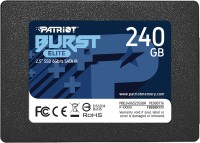SSD Patriot Memory
prices on 7 modelsPatriot P
In most cases, Patriot P series SSDs are simple strips with 3D TLC NAND flash memory layered on top, low-cost controllers from Phison (S9, S11, S12, etc.), a minimum of body kits and lighting. This line meets the expectations of those users who are looking for affordable yet reliable SSD drives, ready to replace old hard drives or add a second drive to an already installed SSD. They will also come in handy when upgrading storage in a laptop or when assembling a compact work or gaming computer.
 |
The P series range is presented in two varieties: classic 2.5" format models (for example P210 and P220) with SATA 3 connection, as well as more compact, faster and modern M.2 with connection via the PCI-E bus of the third or fourth generation. It is the interface that determines how fast the drive will be. Thus, classic 2.5 format drives hit the ceiling when they reach 560 MB/s, PCI-E 3.0 class models accelerate to an average of 1700 MB/s, but for drives with PCI-E 4.0 the upper limit becomes a speed of around 5000 MB/s To avoid overheating, SSDs with PCI-E 4.0 are equipped with simple and compact heatsinks.
The IOPS numbers, which indicate the efficiency of the drive when working with a large number of small files, vary noticeably from model to model: the low-cost Patriot P has an average IOPS of 50 thousand, while older models a la the Patriot P400 and 400 Lite have this figure maybe 10 times higher. Like most inexpensive SSDs, there is practically no DRAM buffer, instead of which a dynamic SLC cache is usually used, and its size is determined by the volume of the drive itself. With the exception of the P400 drives, which come with a 5-year warranty, all other options are limited to a 3-year warranty.



